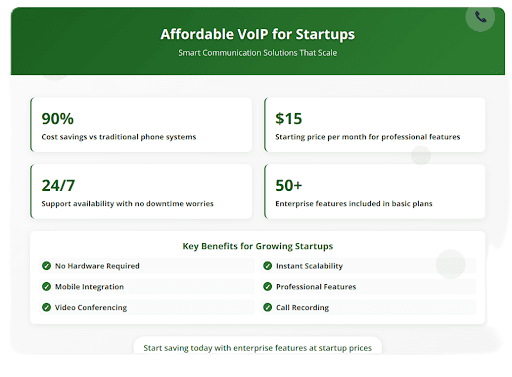Startups can save up to 90% on communication costs with affordable VoIP solutions that deliver enterprise-level features starting around $15 per month.
- Cut costs by 50-90% compared to traditional phone systems
- Enterprise features on startup budgets – advanced calling, voicemail, and routing
- Instant scalability – add users without hardware investments
- Professional credibility – business lines with custom greetings and call management
Choose a VoIP provider with transparent pricing, no contracts, and scalable features.
Starting a business means every dollar counts, especially when it comes to essential services like communication. Traditional phone systems can drain startup budgets with expensive hardware, installation fees, and monthly charges that grow unpredictably. That’s where affordable VoIP for startups becomes a game-changer, offering professional business communication solutions at a fraction of traditional costs.
Small businesses can slash their starting costs by up to 90% using VoIP compared to traditional landlines. This dramatic reduction isn’t just about cheaper calls—it eliminates hardware purchases, reduces maintenance expenses, and provides predictable monthly pricing that helps startups budget effectively.
The shift toward cloud-based communication isn’t just a trend; it’s becoming essential for business survival. With 22% of Americans expected to work remotely by 2025, startups need cheap business VoIP solutions that work seamlessly across locations and devices. Affordable VoIP for startups delivers exactly that flexibility while keeping costs manageable.
Why Affordable VoIP for Startups is Essential for Success
Modern startups face unique communication challenges that traditional phone systems simply can’t address cost-effectively. Limited budgets demand maximum value from every business expense, while rapid growth requires startup phone solutions that scale instantly without major investments.
VoIP technology transforms how startups approach business communication by eliminating the barriers that once made professional phone systems accessible only to large corporations. Instead of paying thousands for equipment and installation, startups can launch with professional communication capabilities for less than the cost of a single traditional business line.
The financial impact extends beyond obvious savings. Businesses can save up to 75% on communication if they opt for VoIP, with some achieving savings as high as 90% on international calls. For cash-strapped startups, these savings can mean the difference between surviving and thriving during critical early growth phases.
Remote Work Enablement
Today’s startup workforce rarely stays confined to a single office. Team members work from home, travel for client meetings, and collaborate across time zones. Traditional phone systems tether employees to physical locations, limiting productivity and creating communication gaps.
Affordable VoIP for startups solves this mobility challenge by turning any internet-connected device into a full-featured business phone. Employees can take calls on smartphones, laptops, or tablets while maintaining the same professional features available in traditional office settings. This flexibility proves especially valuable for startups operating with lean teams where every team member wears multiple hats.
Professional Credibility on Day One
First impressions matter tremendously for startups trying to establish credibility with customers, investors, and partners. Nothing undermines professional image like missed calls, voicemail boxes that sound like personal lines, or communication failures during crucial conversations.
VoIP systems provide immediate access to features that project professional competence: custom greetings, call forwarding, voicemail-to-email transcription, and sophisticated call routing. These capabilities help startups punch above their weight class, appearing larger and more established than their actual size.
Traditional Phone Systems vs. Affordable VoIP: The Real Cost Difference
Understanding the true cost difference between traditional systems and affordable VoIP for startups requires looking beyond monthly service fees. Traditional business phone systems carry numerous hidden expenses that quickly inflate total costs.
Upfront Investment Requirements
Traditional PBX systems demand substantial upfront investments that strain startup budgets. Hardware purchases alone can cost thousands of dollars before adding installation, configuration, and training expenses. Many systems require dedicated IT support for setup and ongoing maintenance, creating additional staffing costs.
Affordable VoIP for startups eliminates these barriers entirely. Cloud-based systems require no hardware purchases, no installation technicians, and minimal setup time. Most startups can launch with professional communication capabilities within hours rather than weeks, using existing internet connections and devices.
Hidden Ongoing Expenses
Traditional phone systems accumulate hidden costs that surprise business owners months after initial installation. Long-distance charges, feature upgrade fees, maintenance contracts, and per-minute overage charges create unpredictable monthly expenses that complicate budget planning.
Cheap business VoIP providers typically offer transparent, all-inclusive pricing that makes budgeting straightforward. Unlimited calling, advanced features, and scalability options come standard rather than as expensive add-ons. This predictability helps startups plan finances more effectively while avoiding surprise charges that strain cash flow.
Scalability Challenges and Costs
Growing startups face expensive scaling challenges with traditional systems. Adding new employees requires purchasing additional hardware, scheduling installation appointments, and often upgrading entire system components. These expansion costs can reach thousands of dollars for relatively small team additions.
The best affordable VoIP for startups scales effortlessly through web-based administration panels. Adding new users takes minutes rather than days, with no hardware purchases or technician visits required. This scalability ensures communication systems grow seamlessly with business needs without creating cash flow disruptions.
Essential VoIP Features Every Startup Needs
Smart startups focus on VoIP features that provide maximum business value while keeping costs reasonable. The following capabilities deliver professional communication experiences that help small companies compete effectively with larger competitors.
When evaluating startup phone solutions, prioritize features that solve immediate business challenges while providing room for future growth. The right cheap business VoIP system should include core functionality plus advanced capabilities that scale with your expanding team.
Core Communication Features
Unlimited calling within major markets eliminates per-minute charges that create budget uncertainty. This feature proves especially valuable for startups making numerous prospecting calls, customer service calls, or team check-ins throughout each day.
Professional voicemail with email integration ensures no opportunities slip through communication cracks. Voicemail-to-email transcription allows team members to review messages quickly and respond appropriately even when unable to take live calls.
Call forwarding and routing directs incoming calls to appropriate team members regardless of their location. Advanced routing rules can send calls to mobile phones, home offices, or other team members based on time of day, caller identity, or availability status.
Business Mobility Solutions
Mobile apps transform smartphones into full-featured business phones, maintaining professional capabilities while team members work remotely or travel. These apps typically include all desk phone features plus mobile-specific enhancements like push notifications and contact integration.
Softphone capabilities allow team members to make and receive business calls from computers, tablets, or any internet-connected device. This flexibility ensures communication continuity regardless of location or device availability.
Business texting enables professional SMS communication using business phone numbers rather than personal devices. This capability helps maintain professional boundaries while providing customers convenient communication options.
With cloud-based systems becoming increasingly important for business communications, secure VoIP solutions help protect both company data and customer communications.
Advanced Features for Professional Growth
Auto-attendant systems create professional first impressions by greeting callers with custom messages and routing options. These virtual receptionists help startups appear larger and more established while ensuring calls reach appropriate destinations efficiently.
Call recording capabilities support training, quality assurance, and compliance requirements. Recorded conversations can help resolve customer disputes, train new team members, and improve service quality over time.
Conference calling facilitates team collaboration and client meetings without requiring expensive third-party services. Many VoIP systems include video conferencing capabilities that replace separate meeting software subscriptions.
How to Choose the Right Affordable VoIP Provider
Selecting the ideal VoIP solution requires balancing feature requirements with budget constraints while ensuring the chosen provider can support long-term growth objectives. Several key factors separate excellent providers from mediocre options.
The market offers numerous startup phone solutions, but finding the right fit requires careful evaluation of pricing models, feature sets, and support quality. Focus on providers that understand startup challenges and offer flexible plans that adapt to changing business needs.
Pricing Transparency and Flexibility
Look for providers offering clear, straightforward pricing without hidden fees or surprise charges. The best cheap business VoIP solutions include transparent per-user pricing that covers essential features rather than charging separately for basic capabilities.
Flexible billing options accommodate startup cash flow realities. Month-to-month plans provide maximum flexibility for businesses with uncertain growth trajectories, while annual plans often offer significant discounts for companies with stable financial projections.
Feature Scalability and Customization
Choose providers that allow feature customization based on individual user needs rather than forcing every team member into identical plans. Some employees might need advanced features while others require only basic calling capabilities, and smart pricing reflects these differences.
Evaluate how easily additional features can be added as business needs evolve. The ideal provider should offer seamless upgrades without requiring system changes or service interruptions that disrupt business operations.
Support and Reliability Standards
Startup teams rarely have dedicated IT staff to manage communication system issues, making reliable provider support essential. Look for 24/7 customer service availability with multiple contact options including phone, chat, and email support channels.
Uptime guarantees demonstrate provider confidence in service reliability. Industry-leading providers offer 99.9% or higher uptime commitments backed by service level agreements that provide compensation for significant outages.
Integration Capabilities
Modern startups rely on numerous software tools for customer relationship management, project coordination, and business operations. Choose VoIP providers that integrate seamlessly with popular business applications to maximize workflow efficiency.
API access enables custom integrations for businesses with specific software requirements. This flexibility ensures communication systems can adapt to unique business processes rather than forcing operational changes to accommodate system limitations.
Additionally, consider providers that offer mobile apps that transform smartphones into full-featured business phones, maintaining professional capabilities regardless of location.
Getting Started with VoIP: Implementation Best Practices
Successful VoIP implementation requires careful planning and execution to maximize benefits while minimizing disruption to business operations. Following proven best practices helps startups avoid common pitfalls that can create temporary communication problems.
Planning Your Migration Strategy
Assess current communication needs by analyzing call volumes, usage patterns, and feature requirements across your team. This analysis helps determine appropriate service levels and identifies potential cost savings opportunities.
Inventory existing equipment to determine what can be repurposed and what needs replacement. Many modern computers and smartphones can serve as VoIP endpoints without additional hardware purchases.
Test internet connectivity to ensure adequate bandwidth for quality voice communication. Most VoIP systems require minimal bandwidth per concurrent call, but inadequate internet service can compromise call quality and user experience.
Training and Adoption Strategies
Start with pilot testing using a small group of users before full deployment. This approach helps identify potential issues and allows team members to become familiar with new features in a controlled environment.
Provide comprehensive training on new features and capabilities that weren’t available with previous systems. Many VoIP benefits go unrealized simply because users don’t understand available functionality.
Document common procedures like call forwarding setup, voicemail access, and conference calling initiation. Written guides help team members adapt quickly and reduce support requests during the transition period.
Optimizing for Long-Term Success
Monitor usage patterns to identify opportunities for plan optimization or feature adjustments. Many providers offer detailed analytics that reveal communication trends and potential improvements.
Regular feature reviews ensure your team maximizes available capabilities as business needs evolve. VoIP systems often include features that become valuable as companies grow, even if they weren’t initially important.
Plan for growth by understanding how easily your chosen system can accommodate additional users, locations, or advanced features. Studies show that 78% of remote employees report higher engagement compared to office workers, making scalable communication tools essential for distributed teams. Proactive planning prevents future migration headaches as your startup scales.
Transform Your Startup Communication Today
Affordable VoIP for startups represents more than just cost savings—it’s about accessing professional communication capabilities that help small businesses compete effectively with larger competitors. The combination of dramatic cost reductions, advanced features, and seamless scalability makes VoIP adoption a strategic imperative rather than a nice-to-have upgrade.
Smart startups recognize that communication infrastructure directly impacts growth potential, customer satisfaction, and operational efficiency. By choosing the right VoIP solution, your startup gains immediate access to enterprise-level capabilities while maintaining the budget flexibility essential for early-stage success.
Ready to slash your communication costs while gaining professional features that grow with your business? Discover how Phone.com’s affordable VoIP solutions can transform your startup’s communication capabilities. Get started today and join thousands of successful startups that have already made the smart switch to cloud-based communication.
Frequently Asked Questions
Q: How much can startups realistically save by switching to VoIP? A: Most startups save 50-90% compared to traditional phone systems. The exact savings depend on current spending, call volumes, and feature requirements, but even conservative estimates show substantial cost reductions.
Q: Will call quality be as good as traditional phone lines? A: Modern VoIP systems often provide superior call quality compared to traditional lines, especially for long-distance calls. Quality depends primarily on internet connection reliability rather than the VoIP technology itself.
Q: Can we keep our existing business phone number when switching? A: Yes, most VoIP providers support number porting, allowing you to transfer existing numbers to the new system. The process typically takes 1-2 weeks and ensures no disruption to customer communications.
Q: What happens if our internet goes down? A: Quality VoIP providers offer call forwarding to mobile phones or other numbers during internet outages. Many also provide mobile apps that can use cellular data networks as backup connectivity options.
Q: How quickly can we set up VoIP service? A: Most affordable VoIP for startups can be operational within hours of signup. Simple configurations work immediately, while complex setups with custom features might require a few days for complete implementation.






